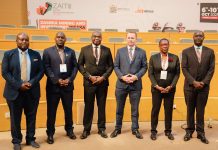It is Monday, 14th November. Midday. The budget speech was three days ago. Zambia’s new Minister of Finance, Hon. Felix Mutati, is clearly a man in demand. He has just spent the last three hours at a KPMG post-budget breakfast briefing at the Intercontinental Hotel. Now, back at the Ministry of Finance building in Lusaka, his reception area is full of business people waiting to see him. The look on their faces suggests they are in for a long wait.
But it’s Mining for Zambia that cracks the nod and gets through the door first. After a walk up three flights of stairs. Why the stairs? Because of the risk of getting stuck in the lifts. A sign in the downstairs lobby, pinned on each lift door, spells it out: “You are kindly advised not to use the lifts due to inconsistent power supply”.
It’s a telling reminder that the power shortage in Zambia is a great leveller, and affects everyone – including Minister Mutati. Electricity seems a natural conversation-starter. The inevitability of cost-reflective tariffs had been raised in the budget speech. But the question on many people’s lips is: whose cost? Is electricity supplier Zesco producing power as cost-effectively as possible?
“We will not pass on any inefficiencies in Zesco to consumers,” says Mutati. “There’ll be full transparency in arriving at the cost-reflective tariffs. There’ll be a public workshop where the consultant doing the Cost of Service Study will explain how he arrived at the numbers. There’ll be no guesswork. We’ve said this exercise is for everyone, not just Zesco. The study involves talking to the mining industry, the private sector – everyone. It’s important to have public ownership, to carry everyone with you. It’s better to know the truth – then we can make the right decisions. We’ve already had the African Development Bank and the UK’s Department for International Development giving us assistance around what needs to be done about Zesco, and its future role in the energy sector.”
Mutati’s honesty is refreshing. Clearly, there are no sacred cows. In his quest for greater economic efficiency and a stronger, faster-growing economy, he faces tough decisions and difficult reforms.

“The removal of subsidies, particularly on fuel and electricity, was a difficult decision,” he says. “We’ve had tough reforms to make too – for example, in agriculture, moving away from the old Farmer Input Support Programme to an e-voucher system, which will help to reduce wastage and inefficiency. We’ve also removed the export bans on certain kinds of crops, which means farmers can now decide what they want to grow and sell, and let the market determine the price instead of us in government.
“We’re also taking a hard look at our State-Owned Enterprises. Government is concerned about their poor performance and low contribution to the Treasury. We’re going to have a situational review done. We need the right recommendations on what needs to be done.”
The genie is out of the bottle; the issue of the performance – or non-performance – of the country’s state-owned enterprises is no longer taboo. These parastatals run huge operations in areas such as electricity, petroleum, telecommunications, railways, insurance, pensions, banking and savings. In his budget speech, Mutati had said emphatically that those that are not viable would be hived off. That means sold to the private sector. Could Zambia therefore potentially enjoy a massive wave of privatisation and investment similar to that which characterised the mining industry in the late 1990s, and helped to usher in a decade of economic growth?
“Absolutely. Government is not in the business of doing business,” says Mutati. “That’s why we have already decided to get out of fuel procurement. The private sector can do more, especially if we have a platform with them and engage with them. Our role as government is to facilitate and regulate. Let’s put our energies where our competencies lie. Our doors are wide open for the private sector; let us be open, let us construct and search together.”
What about the mining industry? Does Mutati feel enough has been done to usher in the new wave of investment and production that Zambia so badly needs in order to reap the benefit of its mineral wealth?
“We have to work in partnership to create wealth for mutual benefit”
“I sat down with the mining industry. They said they want a stable tax regime. We have specifically given them that by writing it into the budget speech,” says Mutati. “The ball is now in their court in terms of investment and production. Tax is not the only variable in mine investment and production. We can’t just give more and more in tax concessions. We need to see some returns. It’s a question of give and take.”
“President Lungu and Cabinet are fully in support of the economic recovery programme,” says Mutati. “Not just 100%, but 110%. He said: let’s take the tough decisions now, at the start of our mandate. This budget was extensively debated. We had six cabinet meetings ahead of the budget. Very detailed. That’s unusual – there normally is only one, and its cursory. We consulted extensively with the private sector. For example, when we went to see the mines in North-Western province, we went with several ministers, together, as a package. It was integrated. You know: half the job is done when you have the ownership of the various ministers.”Fiscal discipline, stability, not spending money we do not have – these are the foundations of Mutati’s 2017 budget. But ushering in a new era of economic growth is not just a Ministry of Finance issue; it involves other ministries too – indeed the whole of government, starting with the President himself. Can Mutati bring the machinery of government along with him?
An oft-heard objection is that real fiscal discipline and cost control won’t happen until there is leadership from government itself – keeping the cost of government down. How confident is Mutati that this is happening?
“If you look at the operational cost of government, it has been frozen at 2016 levels,” he says. “Ministries are having to do more with less. To deliver within their means. They are doing much more in-house. There are not as many workshops. There is less travel.”
The quest for governmental efficiency seems to be eating into the interview time. Mutati’s executive assistant is pointedly checking his watch. Time for one last question. A soundbite is needed. What key message would Mutati like to send out to the business world, the mining industry and investors in general?
“My message is very simple,” he says. “You have a government that is open to engagement, and that will play the role of facilitator rather than interfering. We have to work in partnership to create wealth for mutual benefit.”
That last sentence makes for a nice soundbite. Mutati agrees. A couple more minutes for photographs at his desk, and the interview is over. On the way out, there seem to be even more people waiting in the reception area. It’s going to be a long day.
SEE ALSO: Mutati reinforces new economic thinking at KPMG budget briefing

























This is where we were as a country in 2011 before we decided to kickout a working government. I hope and pray that Zambians won’t make the same mistake twice.